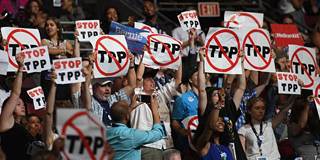Hillary Clinton faces an election that has come to revolve around the legitimacy of a political establishment that she epitomizes. And no issue has fueled that challenge – in the US and Europe alike – more powerfully than international trade.
LONDON – According to conventional economic wisdom, free trade is good – so the freer the better. After all, steady trade liberalization in recent decades has clearly boosted economic growth in developed and developing countries alike. But, as Barry Eichengreen of the University of California at Berkeley notes, “just because economists agree doesn’t mean they’re right.” And even when economists are right about trade, that doesn’t stop vote-chasing politicians from ignoring their advice.
That is certainly true today. “One thing is now certain about the upcoming presidential election in the United States: the next president will not be a committed free trader,” Eichengreen writes. Hillary Clinton, the Democratic nominee, “is at best a lukewarm supporter of freer trade, and of the Trans-Pacific Partnership [TPP] in particular. Her Republican counterpart, Donald Trump, is downright hostile to trade deals that would throw open US markets,” promising to impose high import tariffs, particularly on Chinese goods.
Now add Britain’s referendum vote to leave the European Union (the world’s biggest trade bloc), the demise of the World Trade Organization’s Doha Development Round, and growing opposition to regional deals, and the increasingly fraught politics of trade becomes even more apparent. Clearly, if countries are to benefit from economic openness and avoid its pitfalls, several questions must be addressed.

LONDON – According to conventional economic wisdom, free trade is good – so the freer the better. After all, steady trade liberalization in recent decades has clearly boosted economic growth in developed and developing countries alike. But, as Barry Eichengreen of the University of California at Berkeley notes, “just because economists agree doesn’t mean they’re right.” And even when economists are right about trade, that doesn’t stop vote-chasing politicians from ignoring their advice.
That is certainly true today. “One thing is now certain about the upcoming presidential election in the United States: the next president will not be a committed free trader,” Eichengreen writes. Hillary Clinton, the Democratic nominee, “is at best a lukewarm supporter of freer trade, and of the Trans-Pacific Partnership [TPP] in particular. Her Republican counterpart, Donald Trump, is downright hostile to trade deals that would throw open US markets,” promising to impose high import tariffs, particularly on Chinese goods.
Now add Britain’s referendum vote to leave the European Union (the world’s biggest trade bloc), the demise of the World Trade Organization’s Doha Development Round, and growing opposition to regional deals, and the increasingly fraught politics of trade becomes even more apparent. Clearly, if countries are to benefit from economic openness and avoid its pitfalls, several questions must be addressed.